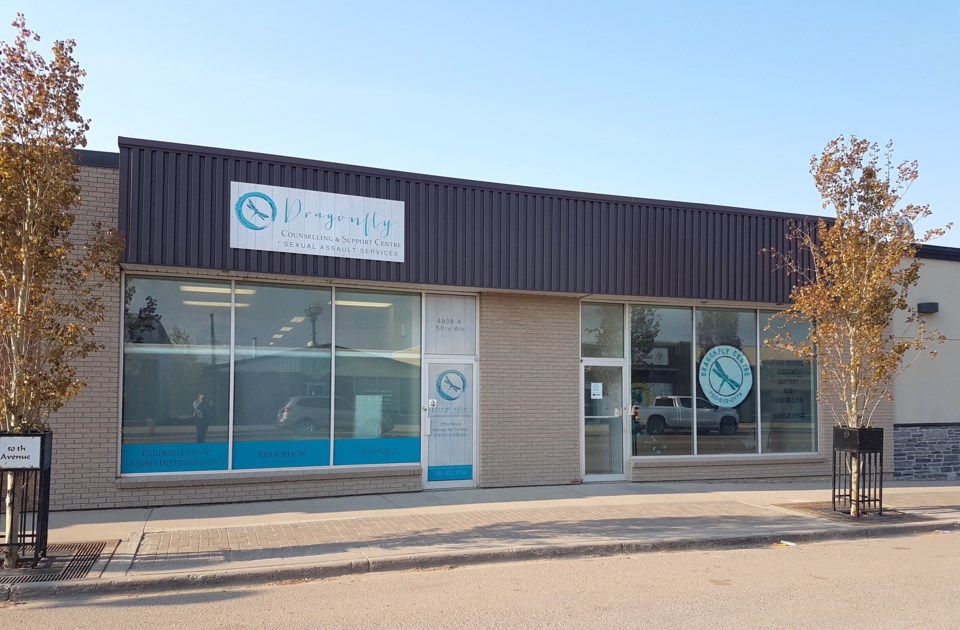LAKELAND – Across the province, sexual assault centres are seeing a growing number of service requests paired with an increased demand for crisis supports, counselling, prevention education and advocacy support.
In April, the provincial government followed through with a commitment to provide additional funding for sexual assault centres to the tune of $4.2 million.
A $3.8 million investment will help address the wait lists at 13 sexual assault centres, according to the ministry of seniors, community and social services.
Another $400,000 will be used to help expand a new service model to provide survivors who are currently waiting for services with resources, supports and information to address their individual situation and needs.
There is a total of 15 sexual assault centres in the province that fall under the Association of Alberta Sexual Assault Services (AASAS).
The Dragonfly Counselling and Support Centre, which has offices in Bonnyville, Lac La Biche and Athabasca, was one of the 13 AASAS recipients to get a slice of the provincial grant. The Dragonfly Centre’s portion was $52,170.
“We were thankful for the follow through and support, but we are struggling with how to appropriately use those funds to meet the increased needs that we continue to see year after year,” said Mikaela Moulton, the interim executive director at the Dragonfly Centre.
The Dragonfly Centre has the largest service area of all sexual assault centres in the province, encompassing communities within the MD of Bonnyville, County of St. Paul, Smoky Lake County, Lac La Biche County, and Athabasca County. It has recently expanded to provide services to clients from the MD of Lesser Slave River and the MD of Opportunity.
All services and supports provided by the non-profit to survivors of sexual assault are provided free of charge.
When the Dragonfly Centre first expanded, most services were delivered virtually because of the pandemic and public health measures that were in place at the time.
“But once COVID ended, and we started to really look at the need that was there, we recognized that there are so many challenges and barriers to accessing services in a small rural community,” said Moulton.
Dragonfly staff continue to see challenges related to Wi-Fi connectivity, cell service, and access to a private and safe space to speak when clients are accessing services virtually.
“With the increase in complex cases and serious or severe cases, a virtual model doesn't work,” noted the interim executive director.
When it comes to seeking in-person counselling and other support services, distance, location and access to transportation can be another barrier for clients.
In 2022, The Dragonfly Centre assisted 2,184 clients and 61 per cent of its clients were minors.
“When it comes to wait times for services for survivors of sexual violence and trauma, the sooner support is given, the better. And really no wait time is acceptable for us,” said Moulton.
“In trying to cut down that wait time and offer a full scope of services for all our communities, we are really exhausting our resources to capacity.”
The Dragonfly Centre has established a rural service delivery model that sees practitioners use a blend of virtual and in-person services, adding a significant amount of travel for the centre’s staff to facilitate the hybrid approach.
A one-day travelling clinic carried out in conjunction with community partners is another tool being deployed by the centre to deliver services in communities without a satellite office.
“It's something that is not quite understood yet about how difficult it is to provide specialized counselling services in rural areas when we are also struggling with bringing qualified staff into the area, not to mention the amount of clinical counselling time that travel takes away. So, it really impacts counsellor caseloads,” acknowledged Moulton. “And there are a lot of rural centres that are experiencing the same thing.”
So how does the Dragonfly Centre plan to utilize their portion of provincial funding? It is not clear just yet, but it will certainly be put to good use.
“I think there is a real understanding of the prevalence of sexual violence and how it has a ripple effect that impacts all of our health care systems, our community systems, mental health systems [and] our school system,” Moulton said.
“Our goal is to not have location dictate somebody's opportunity to access the support that they need.”



